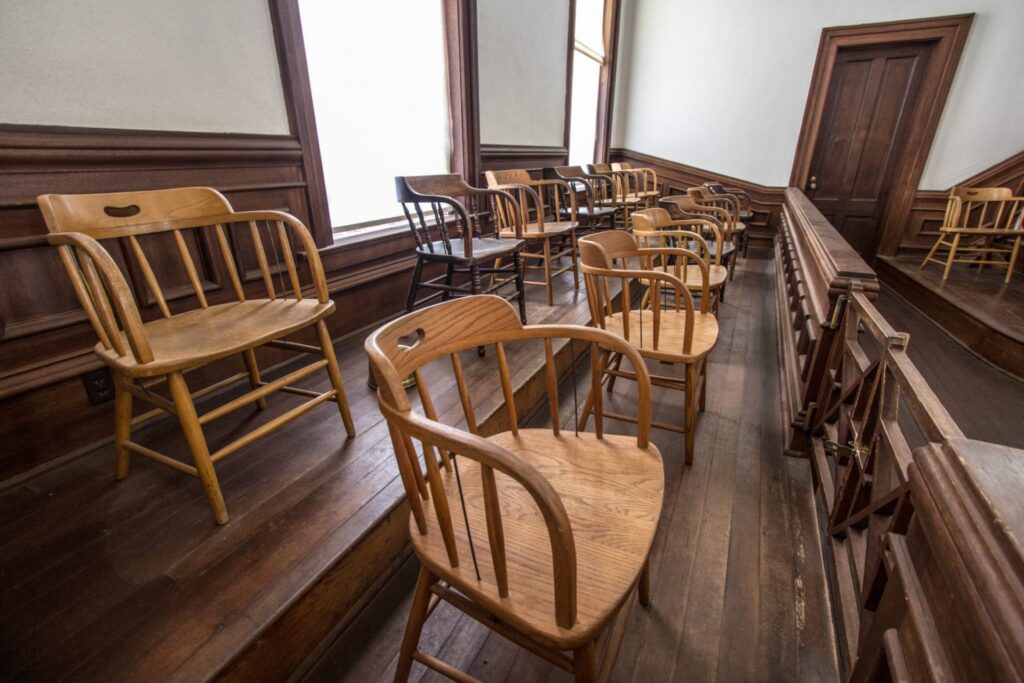If you and the District Attorney’s office cannot agree on a resolution in your criminal case, the Court will prepare for your trial by setting a jury selection date. The actual trial will likely be set sometime in the weeks following your final court appearance, which is normally the dispositional conference. The trial dates and jury selection dates should be known to both you and your attorney, far enough in advance that he/she can prepare a proper defense of your case.
Potential jurors are contacted months in advance from all over the county and asked to fill out questionnaires about themselves. Those questionnaires include questions about past and present employment, relationship to members of law enforcement, any medical issues the would prohibit them from serving on a jury and any additional information the court should know about in advance, such as issues with serving as a juror that weren’t covered in the questionnaire. Your attorney should access these questionnaires in advance of jury selection in order to get an idea of which, if any, potential jurors may pose a problem in your case. By reviewing the questionnaires in advance, your attorney will be better prepared for the fast pace of jury selection.
On the day of jury selection, potential jurors enter the courtroom, where the judge, the State’s attorney, you, and your own attorney are waiting. The judge then asks the jurors a series of questions about their knowledge of the case, relationships with law enforcement, and whether or not they can be fair and impartial in serving on a jury. Having an attorney represent you is crucial, as he or she can use the information provided during this questioning to determine whether they can immediately be struck from your case “for cause”, giving you the fairest jury possible. An attorney can also suggest questions for the judge to ask in addition to the more generic questions already posed, but the judge will only do so for good cause. A good attorney can effectively argue why certain questions will better determine who can be impartial and he/she can oftentimes ferret out potential biases in jurors. Oftentimes, jurors are called up to the side of the judge’s bench (referred to as sidebar), based on how they may have answered a question in open court. This is done to ensure that any information disclosed by the juror remains confidential and private, but also to ensure that the remaining members of the jury aren’t influenced one way or the other by that juror’s answers.
Once the judge poses all of the questions and both parties (prosecutor and defense attorney) have had an opportunity to be heard on potential juror objections and/or had an opportunity to ask additional questions of the jurors during the sidebar session, the clerk of court will begin pulling random numbers that were previously assigned to the jurors. In the case of a misdemeanor, the clerk will pull 23 numbers at random, which comprise the juror pool to choose from in your case. From that 23, each side gets to strike 5 members of the jury, leaving you with 13 jurors, one of which is an alternate in the event that one of the jurors are unable to fulfill their juror obligation during the trial. Both the State and you/your attorney can strike potential jurors from being on your jury for almost any reason with “preemptory strikes”. However, there is case law prohibiting anyone from striking a juror for blatantly discriminatory reasons, but neither you nor the State’s attorney need to give a reason for using a preemptory strike.
After all strikes are used, the jury is picked and you’re left with 13 or 14 people on your juror panel. The number of alternates is usually agreed to ahead of time as more serious cases that may take longer to decide will likely call for 2 alternates, while a one day OUI trial that starts the following Monday may only call for 1 alternate. There are twelve members who will officially deliberate your case, and one or two who are considered alternates. These two will watch the entire trial, but will be dismissed before deliberation unless something happens with the twelve other jurors. In addition, only the judge, the attorneys and the court clerk know who the alternates are. Because we want our alternates to be prepared to step in if needed, we don’t tell them who they are as they likely will “tune out” and not pay attention to the trial.
Jury selection is a fast-paced process that can seem confusing and overwhelming to both clients and attorneys alike. As such, we’re including a link with additional information that you can click on if you’re really curious. Juror information page
If you are facing criminal charges, contact the attorneys of MCD Group immediately to schedule a consultation and prepare for any chance of going to trial.


